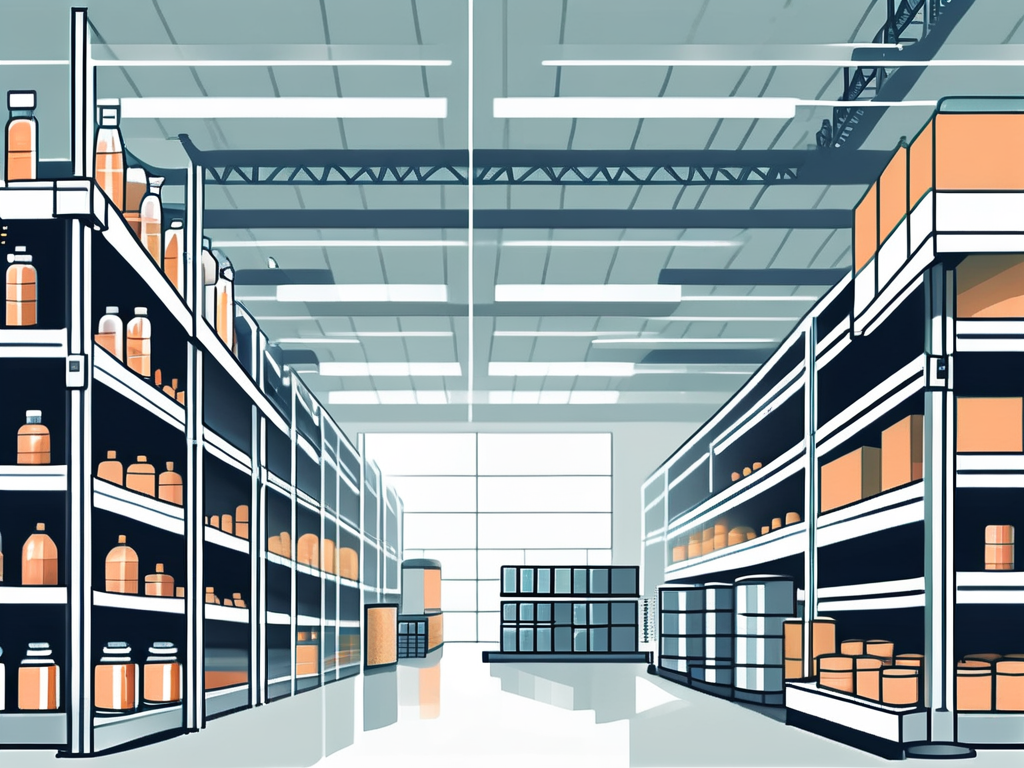In the highly regulated and fast-paced pharmaceutical industry, efficient warehouse management is crucial for ensuring the smooth flow of goods from manufacturing to distribution. The complexities of handling pharmaceutical products, which often require temperature control and strict compliance with regulatory guidelines, make advanced warehouse management solutions indispensable. In this article, we will explore the need for advanced warehouse management in the pharma industry, the key features of advanced warehouse management systems, the impact of technology on pharma warehouse management, regulatory compliance and safety considerations, and the importance of selecting the right management solution for your pharma business.
Understanding the Need for Advanced Warehouse Management in Pharma
Pharmaceutical warehousing poses unique challenges that necessitate advanced management solutions. The storage and handling of pharmaceutical products can be complex and demanding due to their sensitive nature.
The Unique Challenges of Pharma Warehousing
Pharma products often require temperature control to maintain their integrity. From vaccines and biologics to lifesaving medications, strict temperature monitoring and control are necessary to prevent spoilage and ensure the efficacy of the products. In addition to temperature control, pharmaceutical goods must be stored and handled in compliance with regulatory guidelines, including Good Manufacturing Practices (GMP) and Good Distribution Practices (GDP).
Moreover, the traceability and security of pharmaceutical products are paramount in warehouse management. With the rise of counterfeit drugs in the market, ensuring the authenticity and safety of each product is crucial. Advanced warehouse management systems offer features like serialization and track-and-trace capabilities to enhance product visibility and combat counterfeiting.
The Role of Advanced Management Solutions in Pharma Warehousing
Advanced warehouse management systems play a pivotal role in addressing the challenges faced in the pharmaceutical industry. These solutions help optimize inventory control, streamline order processing, and maximize warehouse space utilization. By leveraging real-time data and automation, they enable greater accuracy, efficiency, and compliance in pharma warehousing operations.
Furthermore, advanced management solutions in pharma warehousing incorporate advanced analytics and reporting functionalities. These tools provide valuable insights into inventory trends, demand forecasting, and operational performance. By utilizing data-driven decision-making, pharmaceutical companies can improve supply chain efficiency, reduce costs, and enhance customer satisfaction.
Key Features of Advanced Warehouse Management Systems
Advanced warehouse management systems offer a range of features designed to enhance efficiency and productivity in pharma warehousing. Let’s explore some of these key features:
Inventory Control and Tracking
Effective management of pharmaceutical inventory is crucial for minimizing stock-outs and preventing expired or lost products. Advanced systems provide real-time visibility into inventory levels, track expiration dates, and offer robust inventory management capabilities, ensuring accurate stock control and efficient replenishment.
Order Processing and Fulfillment
The timely and accurate fulfillment of orders is vital in the pharmaceutical sector. Advanced warehouse management systems automate order processing workflows, enabling efficient picking, packing, and shipping of pharmaceutical products. These systems also facilitate order tracking, allowing stakeholders to monitor the status of shipments in real-time.
Warehouse Layout and Space Optimization
Pharmaceutical warehouses often have limited space, necessitating smart layout design and space utilization strategies. Advanced warehouse management systems utilize algorithms and data analytics to optimize warehouse layout, reducing travel time and maximizing space utilization. By eliminating inefficiencies, these systems help improve throughput and productivity.
Another key feature of advanced warehouse management systems is Temperature Control and Monitoring. In the pharmaceutical industry, maintaining the right temperature is critical for preserving the efficacy and safety of medications. Advanced systems come equipped with temperature control mechanisms that ensure the warehouse environment remains within the specified range for storing pharmaceuticals. Real-time monitoring alerts warehouse staff to any deviations, allowing for immediate corrective action to prevent spoilage or degradation of sensitive products.
Furthermore, Integration with ERP Systems is essential for seamless operations in pharmaceutical warehousing. Advanced warehouse management systems can integrate with Enterprise Resource Planning (ERP) systems to streamline processes such as order management, procurement, and financial reporting. This integration enables real-time data synchronization between warehouse operations and other business functions, enhancing overall efficiency and accuracy in pharmaceutical supply chain management.
The Impact of Technology on Pharma Warehouse Management
The integration of technology has revolutionized the way pharmaceutical warehouses operate. Let’s explore some key technological advancements that have transformed pharma warehouse management:
The Role of Automation and Robotics
Automation and robotics have greatly improved the efficiency and accuracy of pharmaceutical warehousing operations. Automated systems can handle tasks such as picking, sorting, and inventory management with precision and speed, reducing the risk of errors and enhancing productivity.
Furthermore, the implementation of robotics in pharma warehouses has led to significant advancements in safety measures. Robots are now equipped with sensors and cameras that allow them to detect obstacles and adjust their movements accordingly, minimizing the risk of accidents and ensuring a safer working environment for warehouse staff.
The Power of Data Analytics in Warehouse Management
Data analytics plays a vital role in optimizing warehouse operations. By analyzing data on inventory levels, order patterns, and warehouse performance, advanced warehouse management systems provide valuable insights that help streamline processes, reduce costs, and improve overall efficiency.
In addition to operational enhancements, data analytics in pharma warehouse management also contributes to regulatory compliance. By tracking and analyzing data related to temperature-sensitive medications, for example, warehouses can ensure that storage conditions meet strict regulatory requirements, safeguarding the integrity and efficacy of pharmaceutical products.
The Future of AI and Machine Learning in Pharma Warehousing
The use of artificial intelligence (AI) and machine learning (ML) in pharma warehousing is rapidly advancing. AI-powered systems can predict demand, optimize inventory levels, and automate decision-making processes. Machine learning algorithms can analyze historical data to identify patterns and anomalies, enabling proactive measures to prevent stockouts and ensure efficient order fulfillment.
Moreover, the integration of AI and ML in pharma warehouse management is paving the way for predictive maintenance strategies. By analyzing equipment performance data in real-time, AI algorithms can anticipate maintenance needs and schedule repairs before breakdowns occur, minimizing downtime and maximizing operational efficiency.
Regulatory Compliance and Safety in Pharma Warehousing
In the pharmaceutical industry, regulatory compliance and safety are of utmost importance. Let’s examine the key considerations for ensuring compliance and maintaining a safe environment in pharma warehouses:
Pharmaceutical warehouses play a critical role in the supply chain, ensuring that medications and healthcare products reach patients safely and efficiently. To uphold the integrity of the pharmaceutical supply chain, warehouses must comply with a myriad of regulations set forth by governing bodies such as the FDA, EMA, and WHO. These regulations cover various aspects of warehouse operations, from storage conditions to transportation requirements, all aimed at safeguarding the quality and efficacy of pharmaceutical products.
Ensuring Compliance with Pharma Regulations
Pharmaceutical warehouses must adhere to strict regulatory guidelines, including compliance with GMP, GDP, and other applicable regulations. Advanced warehouse management systems integrate compliance features such as temperature monitoring, lot traceability, and electronic record-keeping to ensure compliance and simplify audits.
Furthermore, compliance with pharmaceutical regulations extends beyond the physical aspects of warehouse management. It also encompasses data security and integrity, especially concerning sensitive information related to product formulations, manufacturing processes, and patient data. Implementing robust cybersecurity measures is essential to protect this valuable data from breaches and unauthorized access, ensuring compliance with data protection regulations such as HIPAA and GDPR.
Safety Measures in Pharma Warehouse Management
Pharma warehouses must implement robust safety measures to protect personnel, products, and the environment. These measures include proper handling and storage of hazardous substances, adherence to safety protocols, and regular maintenance of equipment. Advanced warehouse management systems provide tools for managing safety procedures, tracking safety incidents, and ensuring compliance with safety regulations.
Moreover, promoting a culture of safety within the warehouse is crucial to mitigating risks and preventing accidents. This involves providing comprehensive training to warehouse staff on safety protocols, emergency procedures, and the proper use of personal protective equipment. Regular safety audits and inspections help identify potential hazards and ensure that safety measures are consistently followed, creating a secure environment for all individuals working in the pharmaceutical warehouse.
Selecting the Right Warehouse Management Solution for Your Pharma Business
Choosing the right warehouse management solution is crucial for optimizing pharma warehouse operations. Consider the following factors when selecting a warehouse management system:
Key Considerations in Choosing a Warehouse Management System
Define your specific requirements and objectives. Consider factors such as scalability, integration capabilities with existing systems, ease of use, reporting capabilities, and support for regulatory compliance. Evaluate different vendors, request demonstrations, and assess their track record and customer satisfaction levels to make an informed decision.
Implementing Your Warehouse Management Solution
Implementing a warehouse management solution requires careful planning and execution. Engage with vendors who offer implementation support and training services to ensure a smooth transition. Consider conducting a pilot implementation to identify any potential issues before full-scale deployment.
In conclusion, advanced warehouse management solutions are vital for addressing the unique challenges of the pharma industry. These solutions enable efficient inventory control, streamlined order processing, and compliance with regulatory guidelines. As technology continues to evolve, automation, data analytics, and AI will play an increasingly significant role in pharma warehouse management. By prioritizing regulatory compliance and safety measures, pharmaceutical companies can ensure the integrity of their products and protect the well-being of their employees. When selecting a warehouse management solution, it is essential to consider factors such as scalability, integration capabilities, and support for regulatory compliance. With the right solution in place, pharma businesses can optimize their warehouse operations, enhance productivity, and meet the demands of the dynamic pharmaceutical industry.







